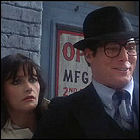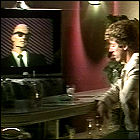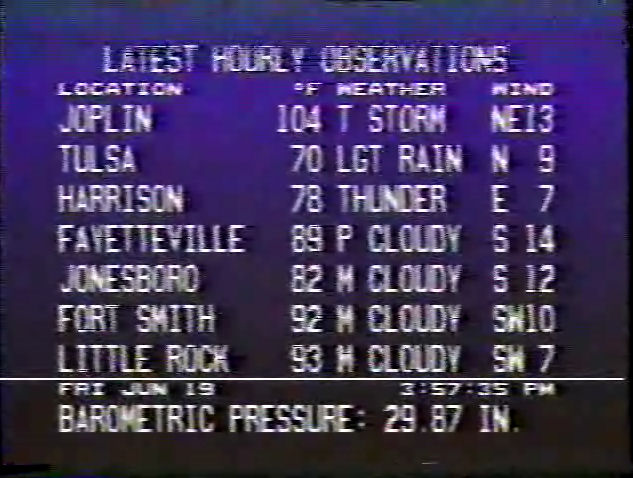 When I was going into high school, I was on a journalism track. That’s what I was good at, that’s what I was excelling in, and it was just assumed that I’d go from having been an MVP in journalism in junior high and high school to doing pretty much the same thing in college. There were a few factors that no one really could have predicted, however: starting with my mother’s death in 1987, home became anything but a welcoming place, and more and more I was concentrating on opportunities to work, because work was a bulletproof excuse for escaping the hell that was home. I flamed out as a college student in 1992. I’ve never set foot in a college as a full-time student again. And before that happened, I had surprised everyone by opting out of the journalism track I was on in my freshman year. I had an instructor who was challenging; any other time that would’ve been fine, but I was being subjected to daily doses of full-blast adversarial at home. In my mindset at the time, anyone who was even slightly challenging toward me was reading as adversarial. My failing, not my instructor’s. It was probably a good idea to drop out of school when I did – actually, I still think to this day that my life would’ve turned out very differently if I had spent a couple of years trying to make it in “the workforce” (of which, as a part-time radio DJ, I was barely even a part) and then gone to school. I probably would’ve had a much better idea of how hard it is to eat and keep a roof over my head with no degree, and I probably would’ve worked my ass off for it.
When I was going into high school, I was on a journalism track. That’s what I was good at, that’s what I was excelling in, and it was just assumed that I’d go from having been an MVP in journalism in junior high and high school to doing pretty much the same thing in college. There were a few factors that no one really could have predicted, however: starting with my mother’s death in 1987, home became anything but a welcoming place, and more and more I was concentrating on opportunities to work, because work was a bulletproof excuse for escaping the hell that was home. I flamed out as a college student in 1992. I’ve never set foot in a college as a full-time student again. And before that happened, I had surprised everyone by opting out of the journalism track I was on in my freshman year. I had an instructor who was challenging; any other time that would’ve been fine, but I was being subjected to daily doses of full-blast adversarial at home. In my mindset at the time, anyone who was even slightly challenging toward me was reading as adversarial. My failing, not my instructor’s. It was probably a good idea to drop out of school when I did – actually, I still think to this day that my life would’ve turned out very differently if I had spent a couple of years trying to make it in “the workforce” (of which, as a part-time radio DJ, I was barely even a part) and then gone to school. I probably would’ve had a much better idea of how hard it is to eat and keep a roof over my head with no degree, and I probably would’ve worked my ass off for it.
But that only happened to Bizzaro World Earl. I never got a degree. In anything. Now it seems I can’t get a job because of it. Which is how I have all this time to write stuff for you fine folks out there lurking in the blog fog.
So you can imagine my surprise when I later found myself working consistently in a professional field which made use of that truncated journalism training. I started as a DJ, moved on to become a TV board op, then moved into production. From there I segued into broadcast promotions, which means very different things if you’re promoting programming/entertainment/events than it does if you’re promoting news. I was greatly amused to be intimately connected with journalism when, on paper, you’d think I wouldn’t have been allowed near it. Dropped college journalism after one year when it had been my presumed degree/career track? What the hell was up with that?
 The business of news promotions, however, was shadowy stuff. It was kind of like the psych ops division of your friendly local news station (Babylon 5 fans, feel free to step away from the computer and say the words “psych ops” out loud. I’ll wait for you to come back after you’ve said “OHHHHHHH”). News promotions had a simple mission: make folks want to watch our news, not the other guys’ news.
The business of news promotions, however, was shadowy stuff. It was kind of like the psych ops division of your friendly local news station (Babylon 5 fans, feel free to step away from the computer and say the words “psych ops” out loud. I’ll wait for you to come back after you’ve said “OHHHHHHH”). News promotions had a simple mission: make folks want to watch our news, not the other guys’ news.
Modus operandi: offer very little concrete information and go for the gut. Hit the base emotions. The money shot in news promo was always being able to say “YOUR FAMILY IS IN DANGER! FIND OUT WHY TONIGHT AT TEN!” (A co-worker of mine caught endless shit once for turning in a completely farcical promo script about how sippy cups would kill your child. She never heard the end of it. I understood, years later, that she wasn’t honestly intending for that to be the on-air script; it was simply the point at which she’d hit her limit of being a BS news merchant and snapped.)
In short: the more you could scare the shit out of them until they felt they had to watch your news, the more you were, to quote Mr. Sheen, “winning.”
I, too, was a professional BS merchant. But only up to a point.
The point at which I hit my BS limit and snapped was only a year or two into my first and only news promo gig to date (which lasted seven years, as much to my amazement as anyone else’s). And the occasion of my snapping? I refused to do my job.
Well, wait, let’s back that up. At some point a prospective employer’s going to read this and go “What!? You’re fi…not hired!” Bad mojo. What I refused to do was to go along with a lazy, reprehensible practice that should never have been instituted in the first place.
 Anytime you have a change of news director in the broadcast world, for all intents and purposes it’s like a change of presidential administration. Things are done differently. Different stories are focused on. The way those stories are told and promoted changes. It’s a sea change.
Anytime you have a change of news director in the broadcast world, for all intents and purposes it’s like a change of presidential administration. Things are done differently. Different stories are focused on. The way those stories are told and promoted changes. It’s a sea change.
The “administration” I was operating under at the time was, frankly, a little bit lazy with regards to some kinds of news. The local police blotter is bread and butter, but how it’s handled differs from newsroom to newsroom. It was common practice for us to put the suspects’ mug shots up, and it wasn’t uncommon for the photogs to grab a shot of the suspects’ home, which was now a matter of public record as part of their rap sheet.
One one occasion, I dared to say no. No, I’m not going to show these people’s faces. I’m not going to show their home.
If you want to get yourself locked in an office having to explain your ass to a room full of people who are all fully capable of saying “Well okay then, you’re fired,” try saying “no” in a TV newsroom.
The accusation in this case – not even at the arraignment phase – was a truly horrifying, heinous crime involving doing things to other people’s kids. Stuff that made me shudder years before I even had a child of my own.
My argument was as follows: this was one of the most horrible crimes I’d ever heard of. We had better be damned sure before we spend all of fifteen seconds forever linking these peoples faces and names and their home – complete with the house number visible on the curb, good going there, photog – with this horrible act. Because sitting down to read an arrest report is one thing. You’re deliberately doing the long haul, trawling for information.
A fifteen-second promo is a whole different matter. You’re audiovisually – arguably, even psychovisually – associating the things that are said with the things and people being shown. Fifteen seconds doesn’t give you time to point out that there hasn’t even been an arraignment before a judge. Fifteen seconds doesn’t  give you time to point out that people are still innocent until proven guilty beyond a reasonable doubt before a jury of their peers in a court of law.
give you time to point out that people are still innocent until proven guilty beyond a reasonable doubt before a jury of their peers in a court of law.
Fifteen seconds is, however, enough time for someone who has their back turned to the TV, or isn’t listening to what’s being said, or isn’t paying attention, to immediately form the shorthand link: my God, these people did something tragically horrifying to some kids.
And, whether the courts find them guilty or innocent, those people are tarred with that brush for life. Because some TV news promo grunt put them on the tube without thinking. Convicted by the idiot box.
I wasn’t going to do that.
There were people in the room who were ready for me to not be employed anymore over this “little” issue.
I reminded everyone in the room of why the local NBC station hadn’t had a newscast for nearly a decade: they’d slipped up, said the wrong thing about a prominent sports figure in the state, and got sued back into the stone age. They hadn’t had a newscast for the better part of a decade because, after the lawsuit, they couldn’t afford to mount one. They’d been a non-news station for much of the ’90s because it took that long to absorb and amortize the cost of the settlement.
If you ever want to see TV news management sweat, mention a libel lawsuit.
The end result: I was still employed, grudgingly, though with a tacit understanding that I’d pissed off the wrong people and was going to be skating on very thin ice for an indeterminate grace period.
And the story didn’t get promoted until the next day; I made a case that there were other stories in the ten o’clock rundown that were much more universally applicable, and not nearly as distasteful.
The folks on the day shift had no problem connecting those people’s faces and names with those acts, though, so I can’t claim a win for journalistic integrity.
But it didn’t happen on my watch. And “my watch” kept happening for another five years or so after that, surviving a handful of new news directors with their own approaches to doing things. A few years later there was a very real lawsuit scare – apparently the wrong mug shot was shown in a promo – and suddenly it was station policy not to show mug shots or arrest photos after that. (See above note about how to get TV news management to break out in a cold sweat.)
Tomorrow I’ll go into my “come to Jesus moment” that led me to go out on that limb, because it was something I believed in fiercely long before this incident.



+ There are no comments
Add yours